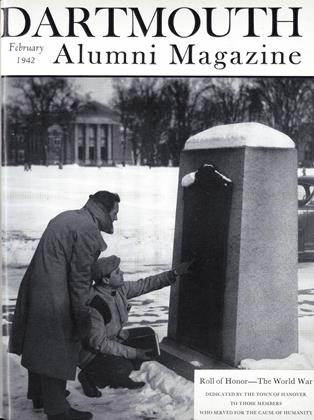ALUMNI will grant that the town of Hanover centered and circled by Dartmouth buildings and equipment, extending from the DOC house on Occum pond down through the campus, the College heating plant and the large athletic buildings, is among the most unique and unusual towns in the country. Faculty, students, tradesmen, retired educators, business men, and families whose men commute forty to eighty miles each day to work in defense industries, suggest the varied population.
A A Now the town is being unified as never before in emergency defense precautions against possible air attack or accommodation of evacuees from pressed areas.
The College, at once separate from and integrated with the Hanover precinct, cooperates directly with the Hanover township civilian defense committee, headed by public safety chairman Archie Gile '17 and spurred by young John Rand '38 of the DOC, who is chief air raid warden, responsible here for the coordination of all town units.
Rand is thus at the head of a pyramid organization which supervises and protects the College buildings and the student personnel, at the same time all precinct and township plans are unified. The efficiency of his College organization depends on carefully delegated authority, Dean Neidlinger '23, Richard Olmsted '32, assistant superintendent of buildings and grounds; Palaeopitus, janitors and fraternity and dormitory student wardens included.
The Dean and Mr. Olmsted function separately under direction from Rand, who, in turn, receives instructions from the state defense office in Concord. The student administration divides down through the Dean to the delegates of Palaeopitus, and the student governing body advises the dormitory and interfraternity councils. Twenty-two dormitories and 23 fraternities, each with appointed wardens, are further divided into leaders, assistants and, if necessary, special squads.
Mr. Olmsted, whose position parallels the Dean's, directs wardens appointed from among the janitors and the staff of night watchmen. Classroom, executive and activities buildings are his immediate concern, while Baker Library, the Hanover Inn, the Hospital and the Gym are selfcontained units cooperating with Rand at the top.
In addition to these measures, the College has responded in other directions. The student fire squad, led by Everett Johnson '42, and fire chief Carl Nott, has been expanded in conjunction with the town's auxiliary firemen. There is a possibility, too, according to Rand, that the student squad may become a separate College unit, with its own equipment.
Seventy-five students, from all classes, answered an appeal several weeks ago to start first-aid training and have already completed their preliminary instruction. These will be placed in "flying squads" which will be available not only for local community emergencies but for any disaster call in neighboring towns. Fifty premeds are receiving special medical instruction through the Hospital staff.
Already in training, more than 100 DOC members have been placed in forest fire squads under the leadership of Ross McKenney and Rand. The latter said that this group may prove to be the most valuable, considering the actual danger facing the community. He believes there is more chance of fire in the surrounding forest area than there is in the towns itself. He said that this trained group, regardless of incendiary bombs, is an asset to the North Country at all times.
Professors in Norwich and Hanover are also active on the town defense, with many of them plane spotters, auxiliary policemen and firemen, street wardens and members of precaution committees. Their wives are taking courses in nutrition, first aid, home nursing and motor corps work.
While general college organizational plans have been completed, evacuation of classes or concentrations at sports events have not yet received detailed attention by either College or town authorities. At time of writing, there is no plan for a complete blackout test although such a test is expected before long.
 View Full Issue
View Full Issue
More From This Issue
-
 Article
ArticleUseless Dartmouth Information
February 1942 By LEON BURR RICHARDSON '00 -
 Sports
SportsBig Green Teams
February 1942 -
 Article
ArticleDartmouth Keeps 'Em Flying
February 1942 By MAJOR WILLIS S. FITCH '17 -
 Class Notes
Class Notes1917*
February 1942 By EUGENE D. TOWLER -
 Class Notes
Class Notes1918*
February 1942 By ERNEST H. EARLEY -
 Class Notes
Class Notes1937*
February 1942 By DONALD C. MCKINLAY
Robert R. Rodgers '42
-
 Letters to the Editor
Letters to the EditorLetters
OCTOBER 1985 -
 Article
ArticleCARPENTER GALLERIES ATTRACT WIDE INTEREST
November 1940 By Robert R. Rodgers '42 -
 Article
ArticleDARTMOUTH BACK TO THE LAND
November 1940 By Robert R. Rodgers '42 -
 Article
ArticleJANITOR'S LIFE
December 1940 By ROBERT R. RODGERS '42 -
 Article
ArticleGALLERIES SPONSOR DESIGN DECADE SHOW
December 1940 By Robert R. Rodgers '42 -
 Article
ArticleBILL O'NEILL'S RECOLLECTIONS
February 1941 By Robert R. Rodgers '42








